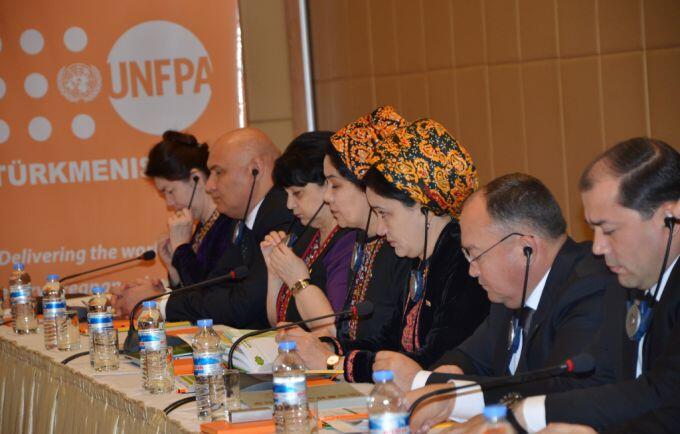Advocacy dialogue with the Inter-agency Commission on implementation of international obligations of Turkmenistan in the field of human rights and humanitarian law, and its Working group.
Advocacy dialogue for advancing the concept of the multi-sectoral response (MSR) to gender-based violence (GBV) was held by UNFPA, United Nations Population Fund with the Inter-agency Commission on implementation of international obligations of Turkmenistan in the field of human rights and humanitarian law, and its Working group.
The purpose of the meeting was to sensitize the national representatives about importance, benefits and challenges of the MSR to gender-based violence, and to inform on the regional and global initiatives and coordination mechanisms in this area.
Ms. Ionela Horga, Programme Coordinator of the East European Institute for Reproductive Health, a partner organization of the UNFPA Regional Office for Eastern Europe and Central Asia (EECA), led the discussion and presented the guiding principles and functions of the multi-sectoral response.
The consultant described the components of the MSR, ranging from service provision to the GBV victims and survivors, system of referral processes and reporting of the cases, training programmes and the need for a diverse team of the professionals, generating data for evidence-based decision making for effective response to GBV, prevention and awareness raising interventions, as well as the mechanisms for multi-sectoral coordination and governance of all activities, which address gender-based violence.
“Within the framework of the Joint Global Programme, last year the United Nations launched a set of Global Standards and Essential Services Package for Women and Girls subject to violence to be provided by the health care, social services, police and justice sector,” said Ms. Horga.
“The importance of the advocacy meeting in Turkmenistan is that we once again put gender-based violence on public and political agenda,” said Ms. Horga. “This was a preparatory meeting, where the decision-makers were sensitized on global and regional initiatives and documents that should be adapted to the national needs.”During the advocacy meeting the national partners were familiarized with the current situation in the EECA region, as well as the Essential Services Package for women and girls subject to violence and Standard Operating Procedures for MSR to gender-based violence, which was developed by the Regional Office to provide clear and detailed description of routine actions of professionals from three key sectors – health, psycho-social and law enforcement – to provide assistance to the GBV victims and survivors.
In Turkmenistan, UNFPA is one of the UN’s lead agencies partnering with the Government to further gender equality and women’s empowerment. A significant move towards closing the gap between laws and reality in this area was made last year with the Government’s adoption of the first National Action Plan on Gender Equality for Turkmenistan for 2015-2020.
“It is noteworthy that the new National Action Plan, which was developed with UNFPA technical support, for the first time will help address the issue of domestic violence in Turkmenistan,” said Ms. Bayramgul Garabayeva, UNFPA Assistant Representative. “Violence against women and girls is one of the most prevalent human rights violations in the world. It knows no social, economic or national boundaries. Globally, an estimated one in three women will experience physical or sexual abuse in her lifetime. In Turkmenistan, UNFPA is ready to work with the Government in adapting the international standards for multi-sectoral response to the GBV to the national needs, as well as to continue our support in conducting a sample survey on domestic violence in the country.”
**
UNFPA: Delivering a world where every pregnancy is wanted, every childbirth is safe, and every young person’s potential is fulfilled.
For additional information, please contact:
Bayramgul Garabayeva,
UNFPA Assistant Representative
Ene Tuyliyeva, Advocacy Communication Associate
Tel: 269255
Web: unfpa.org.tm, tm.one.un.org


